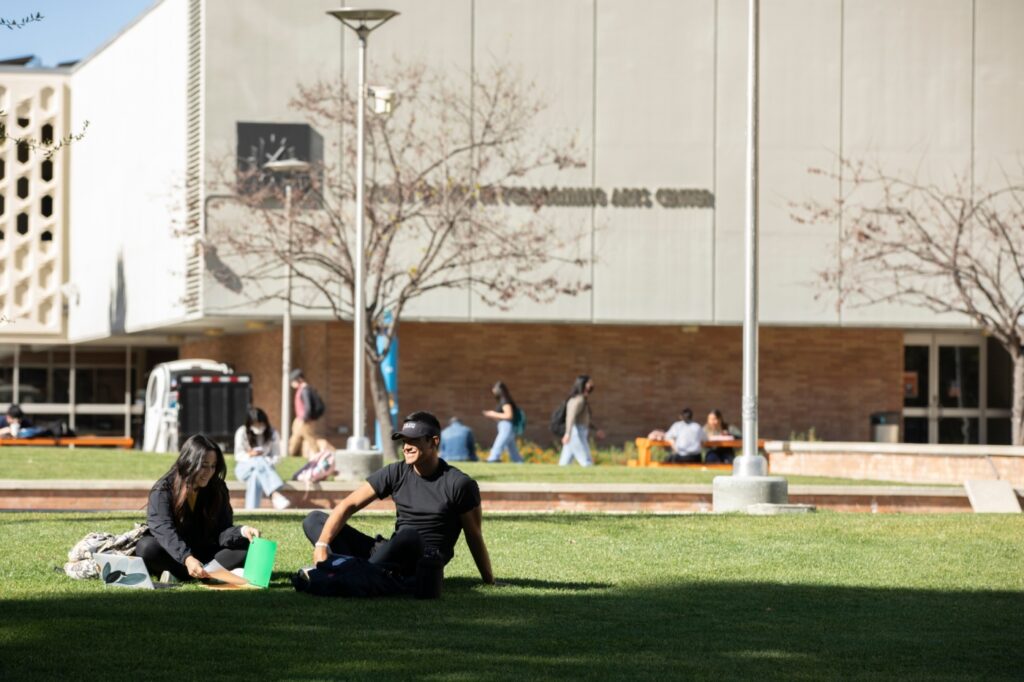
By Nicole Gregory, contributing writer
Students who want to add class credits this summer have a variety of choices, and Cal State Fullerton offers options that make courses accessible to more students. The university is offering five summer sessions of online and in-person classes as well as summer internship programs and study sessions abroad.
Many Cal State Fullerton undergraduate students are not traditional 18- to 22-year-olds, out in four years,” said Karen McKinley, senior director of CSUF’s Extension and International Programs. “The average age of our students is mid-20s, and they are often first in their families to go to college. They not only work but have family obligations, too. Our students prefer flexibility that will help them keep their other commitments.”
Cal State Fullerton’s summer sessions begin at the end of May and are five, six, eight and 10 weeks long. Some classes are scheduled for early morning and others in the evenings, and students have the choice of attending online, in person, or a hybrid of both.
Ever since the pandemic, “which turned everything upside down,” said McKinley, online classes emerged as providing key advantages to students with jobs, families, or who live off campus. Not having to travel to classes is a major convenience.
“(There are) less transportation costs, the course can be completed from anywhere, even on vacation, and you’ll still have a summer to enjoy,” said Debbie Vengco, associate director of marketing and communications for Extension and International Programs.
Another benefit of summer studies: In a university of more than 40,000 students, taking a summer class can help guarantee a spot in a popular course.
“In some majors or for students juggling many commitments, it can be hard to get into all the classes in the fall or spring semesters,” McKinley said. “Summer is an opportunity for students to take units to keep them on track in courses they couldn’t take the rest of the year.”
Summer sessions are most frequently attended by juniors and seniors with graduation in their sights, she said.
Students can also make up units missed, said Vengco, and these summer sessions can help a student complete a course in a shorter time frame. “(They can help) complete prerequisites or GE — general education — courses that you could not fulfill during fall and spring.”
Students can also increase their GPA by retaking a course.
The offerings of summer courses mirror those given in the fall or spring, though summer class sizes are sometimes smaller — and this may feel more comfortable to some students.
“Colleges and faculty determine enrollment limits for classes,” McKinley said. “Some classes are truly limited because of physical capacity — for instance a dance class or a lab — because each student must have the appropriate space for intended instruction or be at a computer or science workstation.”
The chance to study abroad is another opportunity offered in the summer. Though there are still far fewer than in pre-pandemic years, study abroad courses have increased in 2022. This summer, for instance, students are able to study anthropology in Bali, business management in Costa Rica, mathematics in Uzbekistan, or communications in Barcelona, to name a few of the programs.
“We are gradually easing our way back into this,” McKinley said. “Students and faculty are still finding ways to feel comfortable traveling again.”
Signing up for a summer internship can enable students pick up extra credits at a less busy time of the year than fall or spring. “Students can fulfill an internship requirement without having to juggle other course loads,” Vengco said. They can sign up with the Center for Internships on campus and along with a three-unit course, earn credits.
“Business, public health, psychology, human services, art — these all have summer internship courses,” McKinley explained.
Most importantly, taking a summer session is an opportunity to squeeze a course or two in between fall and spring to take the units needed to graduate on time.
“Students who take summer courses do tend to graduate closer to the four-year mark than not,” McKinley said. She quoted statistics from the Office of Assessment and Institution Effectiveness: “Ninety percent of our students who graduate in four years take units outside fall and spring. Of those, 75% are taking those other units in the summer,” she said.
The robust summer program at Cal State Fullerton is carefully designed to benefit students. “It’s popular among our own students because the colleges and faculty here focus on student success and are always thinking of what our students need,” McKinley said.
Related Articles
Titan Voices: First Indian American person to lead CSUF
OC grads prepare to cap another year at colleges, universities
CSUF’s Mathematics Department grant really adds up
CSUF’s nursing program prepares students to serve diverse populations
CSUF student, professor join forces to eliminate negative language in university policy
